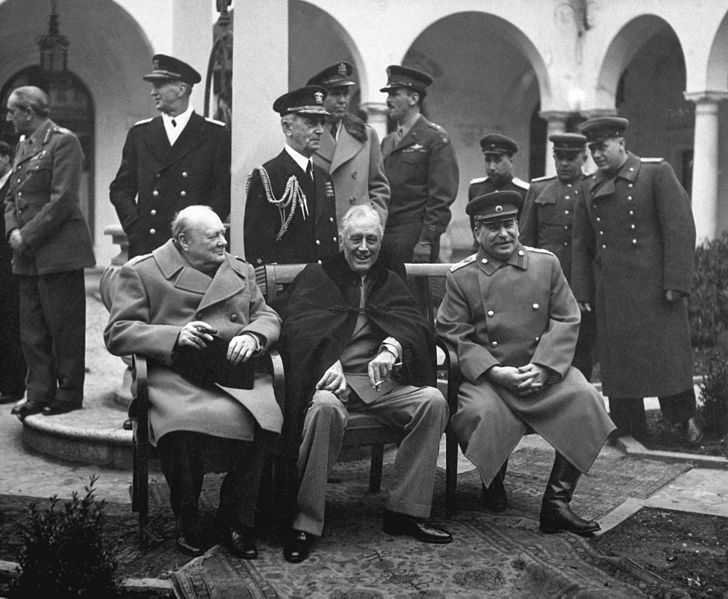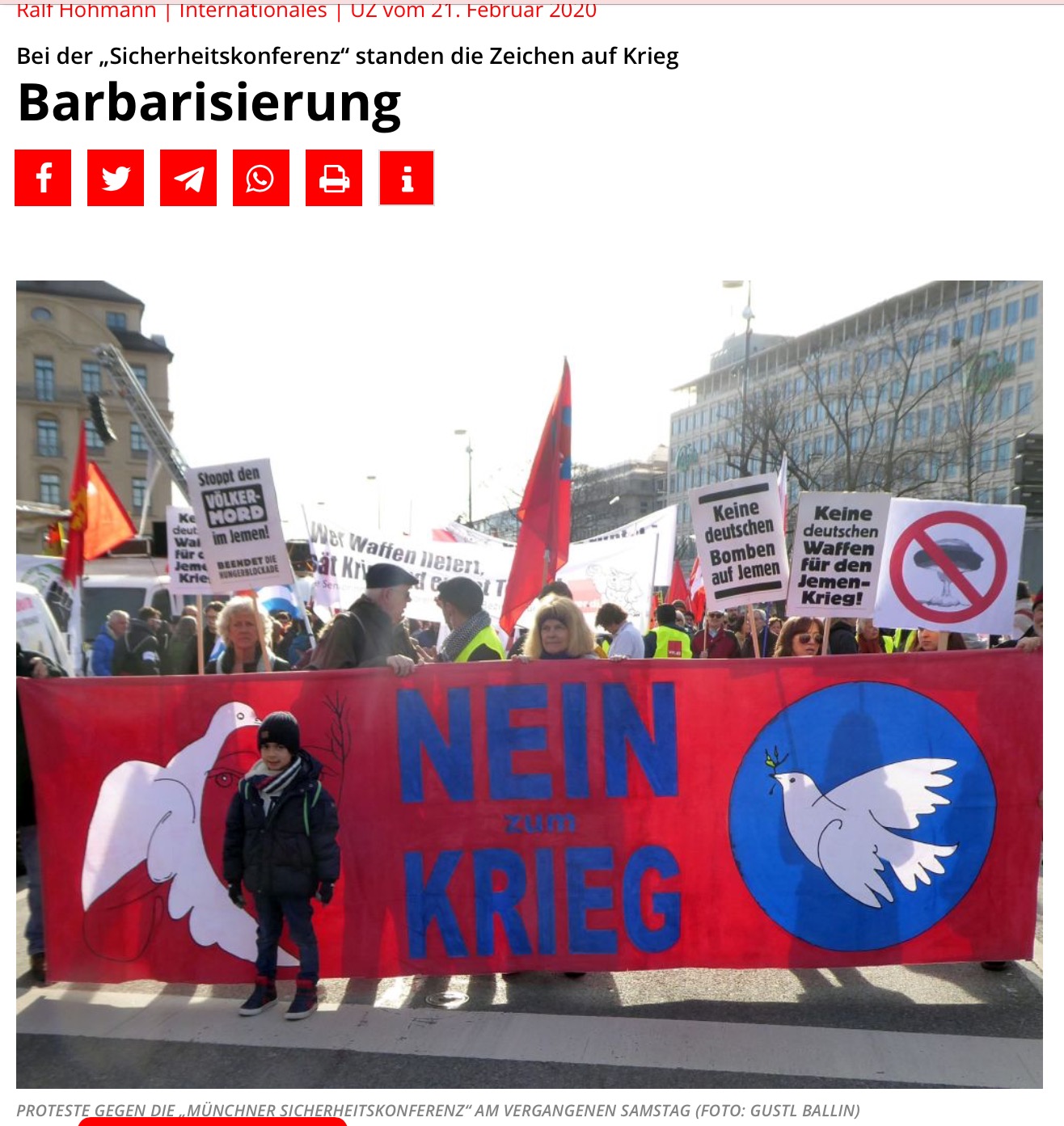From Potsdam to Defender-Europe 20
by Pat Turnbull
This year is the 75th anniversary of the signing of the Potsdam Agreement on 2nd August 1945 by Joseph Stalin, Harry S. Truman and Clement Attlee, representing the victorious allies against Nazi Germany in the Second World War, namely the Soviet Union, the United States, and the United Kingdom. The Potsdam Agreement was founded on the policy of post war cooperation and mutual understanding laid down in the Declaration of Yalta, signed by Churchill, Roosevelt and Stalin, which resulted from the Crimean Conference, February 3rd to 11th 1945. The Potsdam Agreement Part III dealing with Germany, the defeated opponent, states:
"The purpose of this Agreement is to carry out the Crimean Declaration on Germany. German militarism and nazism will be extirpated and the Allies will take, in agreement together, now and in the future, the other measures necessary to assure that Germany never again will threaten her neighbours or the people of the world. It is not the intention of the Allies to destroy or enslave the German people. It is the intention of the Allies that the German people be given the opportunity to prepare for the eventual reconstruction of their life on a democratic and peaceful basis."
To ensure this outcome the Potsdam Agreement laid down: the complete disarmament and demilitarisation of Germany, the arrest and bringing to judgment of those responsible for the war and for Nazi crimes, the final reform of German political life on a democratic basis, the decentralisation of German economic life "for the purpose of eliminating the present excessive concentration of economic power as exemplified in particular by cartels, syndicates, trusts and other monopolistic arrangements."
Germany was, very importantly, to be treated as a single unit, the obligation being to set up a number of central administrative organs for the whole of Germany until the formation of an all-German government. Three days after the signing of the Potsdam Agreement, on 5th August 1945, the New York newspaper PM wrote:
"The decisions on Germany mean a complete defeat of those financial and industrial circles in the United States and Britain who bowed down to fascism before the war and hoped for the renewal of the German big monopolies after the war, who supported Hitler...the removal of German monopoly control over...German industry is an outstanding achievement of this historic conference...The decisions of the Potsdam conference have one aim: to secure peace. Reactionaries everywhere will be dissatisfied with this."
As a consequence of the post war agreement between the allies, a series of military tribunals known as the Nuremberg trials were held in 1945 and 1946. Prominent members of the political, military, judicial and economic leadership of Nazi Germany were tried for their war crimes. In his prosecution speech to the Nuremberg tribunal, the United States Chief Prosecutor, Robert H. Jackson, while admitting that the United States had suffered the least damage in the Second World War, declared that despite this, the USA was determined to make a repeat of German aggression impossible, continuing:
"Twice in my lifetime the United States has sent its young men across the Atlantic Ocean, has nearly exhausted its resources and loaded itself with debts in order to help subdue Germany...The United States cannot throw generation after generation of its youth upon the battlefields of Europe...Experience has taught that wars can no longer be contained; all modern wars finally become world wars, and none of the great powers at least can remain outside. If we cannot remain outside a war then we have only one hope - to avoid it..." It was necessary "to create a legal security that he who begins a war must pay for it."
History has shown what happened to these hopes. Rather than see a united, democratic, de-nazified Germany, the western powers split Germany, keeping the western section as a bastion of big capital, and as the intended military spearhead of aggressive policies against the Soviet Union. Germany finally 'reunited' only in 1990 as the most powerful capitalist country in Europe, with the German Democratic Republic, the German peace state, the state which had fulfilled the Potsdam Agreement, destroyed in the process.
DEFENDER EUROPE MANOEUVRES
A reminder of these ambitions of 75 years ago is timely in the year of United States exercise Defender-Europe 20. Only the spread of coronavirus halted the largest military training deployment in Europe for 25 years. Due to last for five months, the operation would have been at its height in April and May. 20,000 US soldiers were to be the core of the 37,000 troops from 18 NATO countries which were to participate under US leadership. From January about 6,000 US soldiers had been moved from the US to Europe. The US European Command reported that 9,000 vehicles and pieces of equipment from Army Prepositioned Stocks had been moved, and 3,000 pieces of equipment moved via sea from the USA. It viewed the exercise as a success in that respect: soldiers and equipment had been moved from multiple ports to training areas in Germany and Poland. Training had been intended to take place in Belgium, the Netherlands, Germany, Poland, Lithuania, Latvia and Estonia.
The Bundeswehr, the German armed forces, which would have had a central role, called a halt to its participation in mid-March. But German military ambitions were clearly expressed at SiKo, the annual Munich Security Conference (so called), which took place from 14th-16th February with 150 heads of government and ministers, and 500 participants including representatives of arms manufacturers like Raytheon, Kraus-Maffei Wegmann, Airbus, Lockheed Martin and Rheinmetall - all at a cost of 2.6 million Euros to German taxpayers. German paper Unsere Zeit reported that Wolfgang Ischinger, leader and ideas man of SiKo since 2008, bemoaned that Germany was not more involved militarily on a world level: "I think the neighbours would all rejoice if Germany had deployed as many planes against Islamic State as Denmark."
Retired colonel Mikhail Khodarenok who served as an officer at the main operational directorate of the General Staff of the Russian Armed Forces, interviewed by RT on 4/2/20, had no doubt who was the target of Defender-Europe 20: Russia. "Defender-Europe 20 is an exercise of strategic defence and its objective is to counter a 'Russian invasion'. Since there is no indication that Moscow would ever seek to invade Europe, it's clear that these exercises are anti-Russian in nature, and are yet another planned provocation against Russia."
FIGHTING WARS OR FIGHTING CORONAVIRUS?
German newspaper Junge Welt reported that NATO General Secretary Jens Stoltenberg, introducing NATO's latest annual report on 19/3/20, had declared that despite the coronavirus crisis, NATO's ability to carry out operations remained unweakened. "Our armed forces are ready to be deployed." This applied to manoeuvres of the "international battle groups in the east" near the Russian border, and to naval and land interventions "from Afghanistan to Kosovo". Coronavirus had already forced NATO to call off at short notice its March "Cold Response" manoeuvre in Norway, where the war alliance had intended to practise high intensity battles under cold winter conditions: Oslo called a halt in view of the rapidly spreading virus.
When countries the world over are struggling to find the resources to fight Covid-19, it seems particularly inappropriate that, as the NATO General Secretary announced, NATO member states raised military spending by 4.6 per cent in 2019 in comparison to the previous year - to a massive 1,039 billion dollars. The entire national budget of Germany in the same year was 343 billion Euros.
This huge waste is brutally highlighted by the coronavirus crisis. Junge Welt interviewed peace campaigner Michael Schulze von Glasser on 20/3/20. As he said, "Above all else the current crisis shows that there are threats to humanity worthy of our concern. Epidemics and the climate crisis which threaten humanity need to be fought. Instead ...billions of Euros are senselessly pumped into the military." The talk is of mobilising the Bundeswehr against the coronavirus crisis, but one example shows how little suited it is to the task. Chief administrative officer Stephan Pusch, CDU (Christian Democratic Union), responsible for Heinsberg in North-Rhine Westfalia, particularly hard hit by coronavirus, asked for medical help from the laboratory capacity of the Bundeswehr to get prompt test results, but was disappointed that all requests for help were turned down.
(Quotations from the Potsdam Agreement and the Nuremberg trials are from The White Book on the American and British Policy of Intervention in West Germany and the Revival of German Imperialism, National Council of the National Front of Democratic Germany, August 1951.)

Yalta conference (Churchill, Roosevelt and Stalin)

No to war






